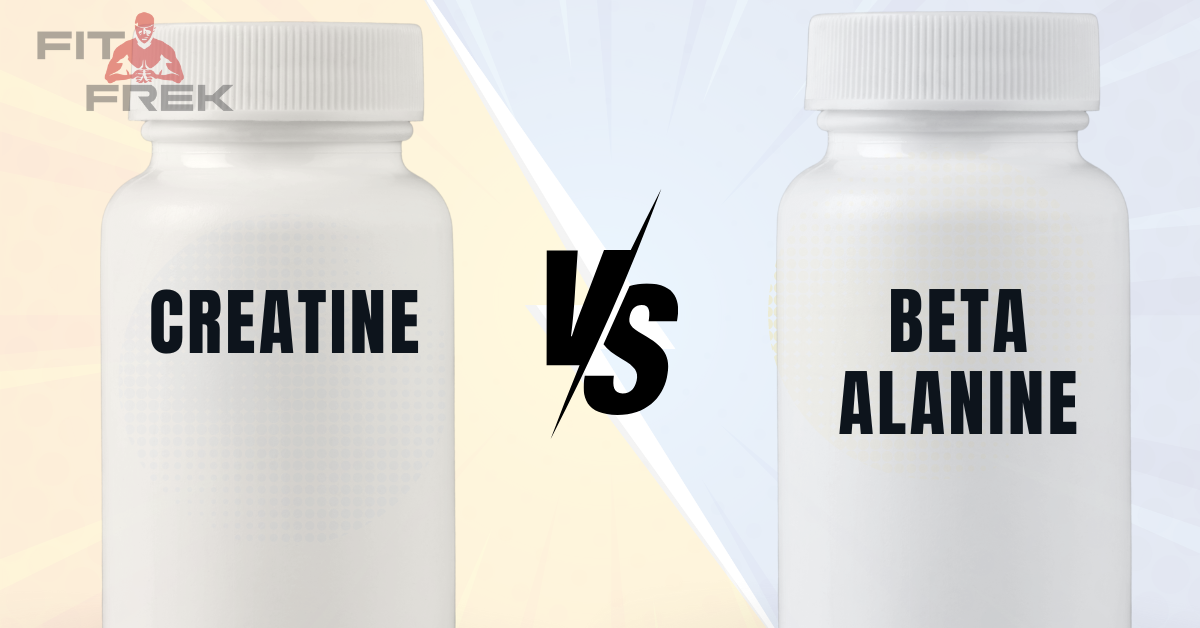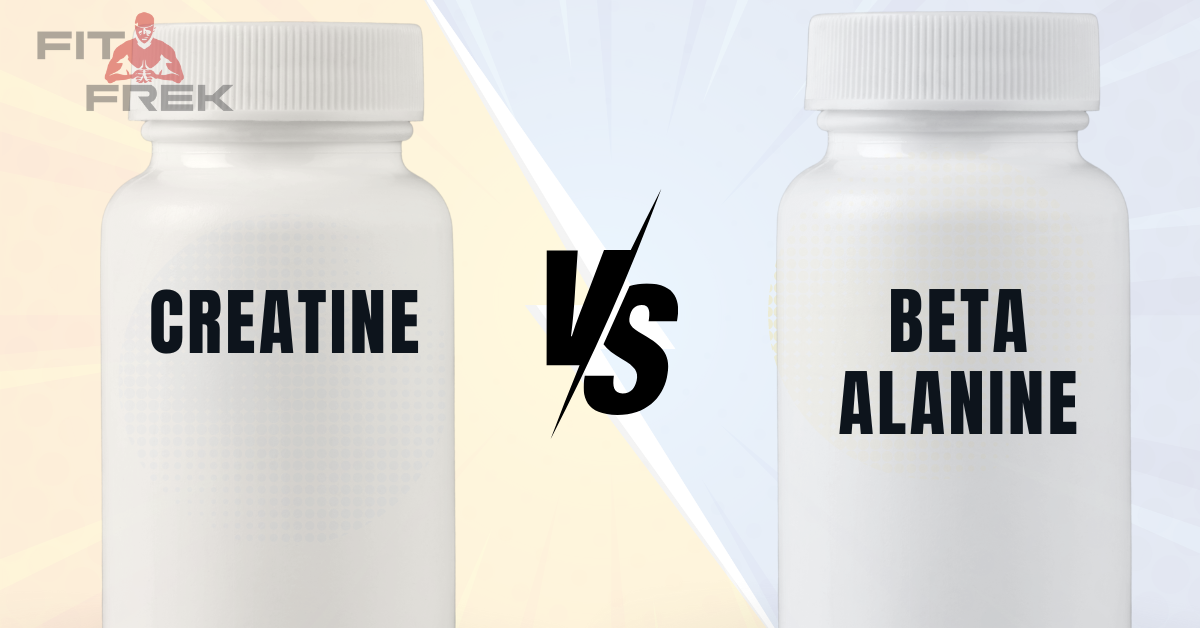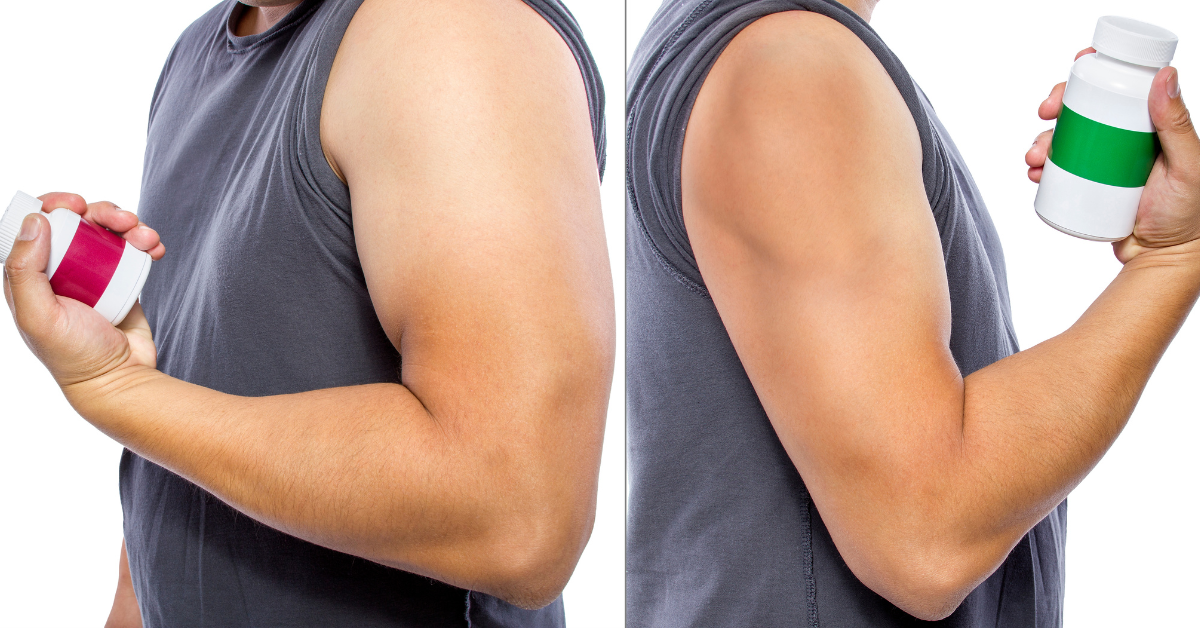






Beta-Alanine and Creatine are two popular supplements athletes, and fitness enthusiasts use to enhance performance, strength, and muscle mass.
While both have unique benefits, their choice often depends on individual goals, tolerance, and preference.
This article aims to comprehensively compare Beta-Alanine and Creatine, shedding light on their ingredients, effects, similarities, differences, and the science behind them.
Beta-Alanine, a non-essential amino acid, is known for its ability to enhance high-intensity exercise performance by increasing muscle carnosine concentrations, as shown in this study.
On the other hand, Creatine, a natural compound found in our muscles, is popular among athletes and bodybuilders for its ability to enhance strength, increase lean muscle mass, and improve exercise performance, as demonstrated in this research.

Beta-Alanine is a non-essential amino acid that the body uses to produce carnosine, a molecule that helps buffer acid in muscles, increasing physical performance in the 60–240-second range.
Beta-Alanine supplementation can also improve moderate to high-intensity cardiovascular exercise performance, like rowing or sprinting.
Creatine is a molecule produced in the body and found in dietary sources like meat and fish.
It stores high-energy phosphate groups in the form of phosphocreatine, which are donated to ADP, regenerating it to ATP, the primary energy carrier in the body.
This role in energy production is particularly relevant under conditions of high energy demand, such as intense physical or mental activity.
Both Beta-Alanine and Creatine are performance-enhancing supplements that offer different benefits.
They both can increase muscle mass, improve performance in high-intensity, short-duration exercises, and reduce fatigue.
However, their mechanisms of action in the body are different, affecting different exercise types.
Beta-Alanine enhances performance by increasing exercise capacity and decreasing muscle fatigue.
It also has antioxidant, immune-enhancing, and anti-aging properties.
The main side effect of Beta-Alanine is paraesthesia, an unusual sensation typically described as "tingling" in the skin, which is harmless and usually subsides once the body gets used to the supplement.
Creatine is known for improving strength, increasing lean body mass, and helping the muscles recover more quickly during exercise.
This muscular boost may help athletes achieve bursts of speed and energy, especially during short bouts of high-intensity activities such as weight lifting or sprinting.
However, creatine does not seem to improve endurance or aerobic conditioning.
Let's get into the science behind both supplements...
Beta-Alanine supplementation increases muscle carnosine concentration, which helps buffer the acid produced during high-intensity exercise.
Increased carnosine levels can enhance performance in events that require large bursts of energy over a short period.
Research shows that Beta-Alanine can improve exercise performance and increase lean body mass in athletes.
Creatine supplementation increases phosphocreatine stores in muscles, which is used to produce more ATP during high-intensity exercise.
This can lead to improved performance in strength and power exercises.
Numerous studies have shown that creatine supplementation can improve exercise performance and adaptation to training.
Beta-Alanine is a non-essential amino acid that is produced naturally in the body.
It plays a crucial role in the production of carnosine, a compound that helps to buffer acid in muscles, thus improving physical performance during high-intensity exercise (source).
Research shows that beta-alanine supplementation can significantly increase carnosine levels in muscles, which can delay muscle fatigue and enhance overall athletic performance (source).
This is particularly beneficial during high-intensity and short-duration exercises like weight lifting or sprinting.
One study found that beta-alanine supplementation improved time to exhaustion in high-intensity interval training (source).
This means that athletes could train longer and harder, leading to improved performance and muscle gains.
However, it's not just athletes who can benefit from beta-alanine.
Research shows that beta-alanine supplementation can also improve muscle endurance in older adults (source), making it a valuable supplement for maintaining physical fitness and muscle strength as we age.
Creatine is a substance that is found naturally in muscle cells.
It helps your muscles produce energy during heavy lifting or high-intensity exercise (source).
Taking creatine as a supplement is very popular among athletes and bodybuilders in order to gain muscle, enhance strength, and improve exercise performance (source).
Numerous scientific studies confirm that creatine can increase muscle mass.
A comprehensive review of the most popular supplements selected creatine as the single most beneficial supplement for adding muscle mass (source).
In addition to improving physical performance, creatine also provides cognitive benefits.
Research shows that it can improve short-term memory and reasoning skills, making it a popular supplement among students and professionals (source).

Beta-Alanine is a non-essential amino acid that's naturally produced in the body.
It's a popular ingredient in pre-workout supplements because it enhances muscular endurance.
Here's a simplified breakdown of how it works:
Creatine is a substance that's naturally found in muscle cells.
It's commonly used in fitness supplements because it produces rapid energy during heavy lifting or high-intensity exercise.
Here's a simplified explanation of its benefits:
When taken at recommended doses, beta-alanine and creatine are generally considered safe for healthy individuals.
However, they can cause some side effects.
Beta-alanine may cause a tingling feeling in the skin.
This is a harmless side effect known as paresthesia (source).
It is usually mild and goes away on its own.
Creatine can cause some side effects, including stomach pain, nausea, muscle cramping, and diarrhea (source).
It can also cause water retention, leading to weight gain (source).
It's important to note that while these supplements are generally safe, they may interact with certain medications or medical conditions.
Therefore, talking to your doctor before starting any new supplement regimen is always a good idea.
While both supplements can enhance high-intensity exercise performance, they work differently.
Beta-Alanine increases carnosine levels in muscles, which helps buffer acid during high-intensity exercise, while Creatine increases phosphocreatine levels, helping produce more ATP, the body's primary energy molecule.
Both supplements are convenient as they are available in various forms such as powders, capsules, and tablets.
The choice between the two would depend on individual preferences and fitness goals.
Both Beta-Alanine and Creatine are well-researched supplements.
However, Creatine has been studied extensively and has more evidence supporting its benefits for strength and power exercises.
While both supplements can improve exercise performance, Creatine is more effective for strength and power exercises.
At the same time, Beta-Alanine is more beneficial for exercises that require large bursts of energy over a short period.
The choice between Beta-Alanine and Creatine would depend on individual fitness goals.
Creatine would benefit strength and power exercises more, while Beta-Alanine would be more effective for high-intensity, short-duration exercises.

What are the benefits of Beta-Alanine?
Beta-Alanine supplementation has been shown to increase carnosine concentrations in skeletal muscle, which can enhance high-intensity intermittent exercise performance.
What are the benefits of Creatine?
Creatine supplementation can enhance strength, increase lean muscle mass, and improve exercise performance.
Can I take Beta-Alanine and Creatine together?
Yes, research has shown that co-ingesting Beta-Alanine with Creatine may have synergistic and/or additive benefits.
Are there any side effects of Beta-Alanine and Creatine?
Both Beta-Alanine and Creatine are generally considered safe for healthy individuals. However, some people may experience tingling skin (paresthesia) with Beta-Alanine and gastrointestinal discomfort with Creatine.
Which one is better, Beta-Alanine or Creatine?
Both supplements have their own unique benefits. Beta-Alanine focuses more on improving high-intensity exercise performance, while Creatine is more for enhancing strength and muscle mass. The choice between the two would depend on your specific fitness goals.
How much Beta-Alanine and Creatine should I take?
The recommended dosage for Beta-Alanine is around 2-6 grams daily; Creatine is typically 5 grams daily. However, following the manufacturer's instructions on the supplement label is always best.
When should I take Beta-Alanine and Creatine?
Both Beta-Alanine and Creatine can be taken at any time of the day. However, many people prefer to take them before a workout for maximum benefits.
Can Beta-Alanine and Creatine improve mental performance?
While both supplements are primarily known for their physical performance benefits, some studies suggest they may also have potential cognitive benefits.
Are Beta-Alanine and Creatine supplements vegan-friendly?
Yes, both Beta-Alanine and Creatine supplements can be vegan-friendly. However, it's always best to check the product label to ensure it contains no animal-derived ingredients.
Can I take Beta-Alanine and Creatine if I'm pregnant or breastfeeding?
Generally, it's always best to consult with a healthcare professional before taking any supplements if you're pregnant or breastfeeding.
Beta-Alanine and Creatine are effective supplements for enhancing exercise performance, but they work in different ways and affect different types of exercises.
The choice between the two should be based on individual fitness goals, tolerance, and preference.
Consulting with a healthcare professional before starting any new supplement regimen is recommended.



Useful Links
 About FitFrek
About FitFrekFitFrek operates as an independent platform, offering comprehensive workouts, programs, routines, guides, and unbiased reviews to accelerate your progress. We pride ourselves on our honesty, delivering straightforward and candid insights. FitFrek does not offer medical advice, diagnosis, or treatment services.